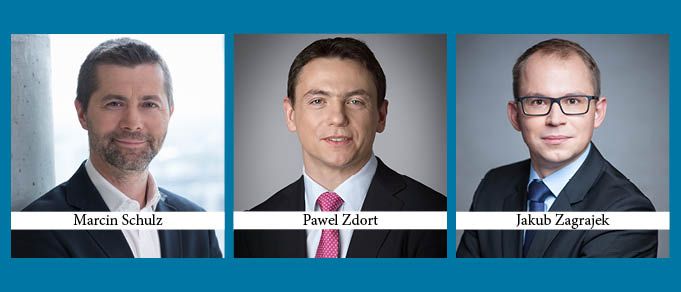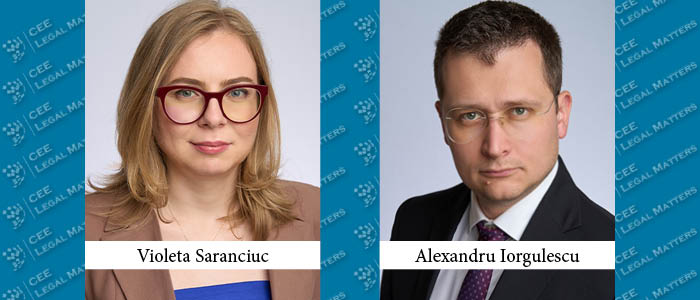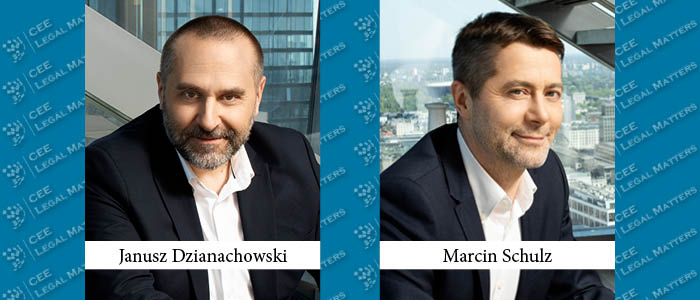The Deal: In July 2018, CEE Legal Matters reported that the Warsaw office of Linklaters had advised Polish rolling stock manufacturer PESA Bydgoszcz and its shareholders on the sale of 100% of the company to the Polish Development Fund. Weil, Gotshal & Manges advised the Polish Development Fund on the acquisition.
We reached out to both firms for more information.
The Players:
- Counsel for PESA Bydgoszcz: Marcin Schulz, Partner, Linklaters
- Counsel for the Polish Development Fund (PFR): Pawel Zdort, Partner, and Jakub Zagrajek, Senior Associate, Weil Gotshal & Manges
CEELM: Marcin, how did you and Linklaters become involved with PESA Bydgoszcz in this matter? How were you selected as external counsel initially, and when was that?
M.S.: We became the advisor to PESA Bydgoszcz and its shareholders back in October 2017. Initially our relationship began with our involvement in a litigation matter, followed by refinancing discussions, which eventually morphed into Linklaters becoming the exclusive advisor on all matters relating to the refinancing of PESA Bydgoszcz’s loan facilities and the sale process to PFR.
CEELM: What about you, Pawel? How did you and Weil become involved with Polish Development Fund in this matter?
P.Z.: We have known certain members of the Polish Development Fund investment team for quite some time – they are esteemed professionals with an established presence in the Warsaw investment community. Jakub and I first encountered PFR’s team while working for UniCredit in connection with the disposal of its stake in Bank Pekao – the largest M&A transaction in the Polish market signed in 2016, when we sat on opposite sides of the negotiating table. PFR subsequently retained us in connection with the PESA transaction (in October 2017) and certain other deals. This type of business generation is the most satisfying for us as lawyers since it proves to us that our performance and dedication are noted and appreciated by all of the parties to a transaction, particularly as PFR always selects its legal counsel in an auction process where several law firms compete with each other for a mandate.
CEELM: And what was your initial mandate when you were first retained for this particular project?
P.Z.: Our initial mandate encompassed all key aspect of the potential transaction, including structuring, due diligence, and antitrust issues, as well as negotiations of the transaction documents.
CEELM: Who were the members of your teams, and what were their individual responsibilities?
M.S.: It was a true team effort. Jarek Miller, Head of our Banking & Finance Practice, supported by Agata Brzozek, advised PESA on all refinancing-related matters in the process. I and Szymon Renkiewicz, supported by Klaudia Krolak, Jakub Wozniak, and Ewa Szmigielska took the lead on the sale process itself. We also engaged Malgorzata Szwaj, Head of our Competition/Antitrust Practice, and Wojciech Podlasin, in relation to advising the client on merger control and related issues. The financial advisor was Deloitte (Zbigniew Majtyka and Wojciech Labus).
P.Z.: I was the relationship partner on the deal and Jakub was responsible for the day-to-day work on the transaction, with the support of Michal Milewski, an associate. Marcin Iwaniszyn, a partner, and Zofia Frydrychowicz, counsel, who jointly Head the Banking and Finance practice, advised on financial issues related to the transaction, and they were assisted by associates Barbara Skardzinska and Jakub Czerka.
The due diligence team was headed by Monika Kierepa, counsel, and included associates Kamil Kozlowski, Tomasz Karkowski, Kacper Stanosz and Pawel Mazur. Magdalena Pyzik, counsel, and associate Jerzy Bombczynski were responsible for restructuring issues.
Iwona Her, a partner and the Head of the Warsaw office’s Competition practice group, and associates Irmina Trybalska and Leszek Cyganiewicz advised on antimonopoly issues. Robert Krasnodebski, a partner, senior associate Marek Kanczew, and associate Franciszek Dewille were responsible for tax advice.
CEELM: Please describe the final deal in as much detail as possible – in other words, how was the deal structured, and how did you help it get there?
M.S.: Throughout the past year, the press has been abuzz with reports of PESA Bydgoszcz’s financial difficulties. Our aim was to help the company and its shareholders both to overcome these problems and to secure the engagement of a stable investor who could build on the incredible potential offered by the company, built over many years. From a structural point of view, this transaction combined refinancing with the sale to PFR as the investor of 100% of shares in PESA Holding, which in turn controls PESA Bydgoszcz. The transaction is conditional and we expect closing to take place in September.
J.Z.: In accordance with the investment agreement signed on July 16, 2018, PFR’s investment in PESA encompasses two elements: the acquisition by an investment fund managed by PFR of all of the shares in PESA Holding (a limited liability company holding approximately 99% of the shares in PESA) from the current shareholders (i.e. the founders and certain former management board members of PESA); and a PLN 300 million investment in PESA by that PFR-managed investment fund.
The structure of the transaction changed during the course of the negotiations. The initial discussions envisaged that the sellers would retain a certain stake in PESA Holding and that a shareholders agreement would set out the principles of governance, exit, etc. However, the deal structure that was finally agreed was an outright sale of the entire stake in the target company, with the sellers being entitled to certain earn-out payments if particular conditions are met in the future.
CEELM: What would you describe as the most challenging or frustrating part of the process? Why?
M.S.: The key challenge in the transaction was its complexity and the need to align the interests of different parties involved in the process.
J.Z: The final stages of the negotiations overlapped with the 2018 World Cup in Russia, which meant that aligning the availability of all of the parties involved was extremely difficult, this despite the fact that not all legal advisors are all that interested in football.
P.Z.: In all seriousness, I believe that the most challenging aspect of the transaction was aligning the results of the discussions of the financial team (involved in the discussions with the financing banks and insurance companies) and the transactional team.
CEELM: Was there any part of the process that was unusually or unexpectedly smooth/easy?
M.S.: Let me say that we enjoy getting involved in complicated transactions with plenty of challenges. This has certainly been one of those transactions.
P.Z.: Our antitrust team managed to ensure that the antitrust clearance from Poland’s Office of Competition and Consumer Protection was obtained prior to the execution of the investment agreement – in fact very soon after the filing of the relevant application. This allowed us to slightly simplify the transaction structure just before signing the deal.
CEELM: Did the final result match your initial mandate, or did it change/transform somehow from what was initially anticipated?
M.S.: Speaking from experience, I don’t think there has been any transaction where the final result fully matched the initial mandate, so obviously there were certain changes as we went down the transaction road map. For a number of valid reasons, the structure of the transaction had to be re-shaped more than once but we are quite happy with the final result.
P.Z.: Our final mandate was extended so as to also cover the provision of assistance to PFR in connection with the discussions with the financing banks as well as transactional tax advice.
CEELM: What individuals at PESA Bydgoszcz directed you, and how would you describe your working relationship with them?
M.S.: Our roles were multiple and we had to consider the interests of PESA Bydgoszcz and its shareholders alike. We worked with all of the seven shareholders controlling PESA Bydgoszcz as well as with the Management and the Legal Team at PESA Bydgoszcz. The longer the project took, the closer the co-operation became, and I am confident when I say we won the trust of our clients.
CEELM: What about you, Pawel and Jakub? Which individuals at PFR directed you, and how would you describe your working relationship with them?
J.Z.: The PFR team was led by Marcin Piasecki, the Vice-President of PFR. The investment team of PFR consisted of Adam Brulinski, Grzegorz Stepinski, and Sebastian Marchel. The legal aspects of the deal were managed by Joanna Blaszczyk, head of PFR’s legal team responsible for investments. PFR is a demanding client and the members of its team come from various backgrounds and have strong transactional experience. PFR did not even retain a financial advisor in connection with the transaction and handled the transaction internally. The PFR team members worked very closely with their legal advisor and are just as familiar with every bit and piece of the investment agreement as we are.
CEELM: How would you describe the working relationship with your counterparts at Weil on the deal?
M.S.: The complexity of the transaction was a challenge to all advisors alike. To properly respond to the challenge, we had to build a solid, collegial working relationship with our peers across the table. I enjoyed working with colleagues from Weil and strongly believe that together, we helped to advance the deal and avoid a number of pitfalls. I trust that Pawel, Jakub, and Michal would co-sign my assessment.
CEELM: Is that right, Jakub? What was your relationship with your counterparts at Linklaters like?
J.Z.: I would describe it as very smooth. Linklaters’ team was led by Marcin Schulz, a pragmatic and experienced M&A lawyer. It was very important for us that PESA retain an established legal advisor with sufficient experience to handle such a complex transaction. Based on our experience with sellers of a business who are individuals – in particular company founders or former management – Marcin needed to participate in long and demanding discussions with PESA’s sellers in order to ensure that their respective positions were aligned.
CEELM: How would you each describe the significance of the deal?
M.S.: The Polish Development Fund is a strategic company belonging to Poland’s State Treasury, serving the long-term development of Poland’s investment and economic potential. In March 2018, it was reported that the PFR would be directly involved in PESA. The financial problems of the Bydgoszcz producer, stemming from delays in the implementation of contracts towards the tail-end of the EU funding period (2007-2013), as well as a lack of new orders after the end of the EU funding period, were already widely known at that time. Following this transaction, the PFR Group became the largest player on the domestic rail market and is key to the greater strategy of transforming PESA into the biggest rolling stock producer in Poland. The investment in PESA Bydgoszcz entails a change in the company’s market strategy. Thanks to this transaction, PESA will obtain the necessary funds needed to finance and implement its strategic objectives.
P.Z.: As PFR stated in its press release, the investment in PESA Bydgoszcz entails a change in the company’s market strategy. PESA plans to optimize production by improving management and quality control standards, as well as producing longer series. It will selectively choose new contracts. The new strategy assumes the intensification of development in foreign markets such as Italy, Germany, the Czech Republic, and Romania. We take great pride, both collectively as Weil and as individuals, in having advised PFR in connection with this unique business opportunity. We hope that the final result of the transaction will be that in a couple of years it will become quite standard to jump on a PESA train or tram not only in Poland, but in other European countries.
This Article was originally published in Issue 5.9 of the CEE Legal Matters Magazine. If you would like to receive a hard copy of the magazine, you can subscribe here.





























